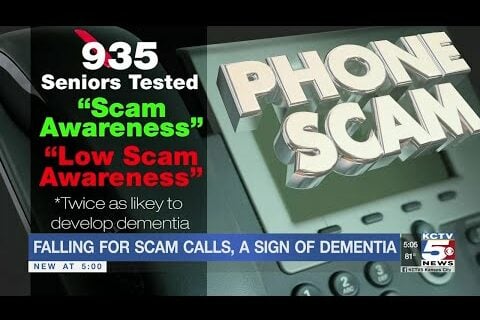
Scam Protection for People with Dementia
KEEP YOUR MONEY SAFE – VIDEO & ARTICLE: We’ve all heard stories of crooks taking advantage of people with Alzheimer’s. See how to protect people with dementia from scammers.

KEEP YOUR MONEY SAFE – VIDEO & ARTICLE: We’ve all heard stories of crooks taking advantage of people with Alzheimer’s. See how to protect people with dementia from scammers.

ELDER ABUSE (VIDEO + ARTICLE): Scammability, or ease of getting scammed, is a warning sign for dementia. Caused by loss of social judgement, it occurs before thinking or memory problems.

People with dementia may be even more vulnerable to fraud and scams than previously thought, according to an NIA study. See the story of one victim with a happy ending. Read the research.

MONEY PROBLEMS are inevitable for people with Alzheimer’s handling their own finances. Learn how to spot them, what steps to take, and how to protect

NEW CARE VIDEO: Barbara bought $30,000 in supplements before her son caught the scam. Barbara has dementia. There are 240,000,000 UK scam phone calls per

This beautiful song captures a son’s dedication to his father with Alzheimer’s. Starting from his window in a care facility, the gorgeous imagery unfolds into a most moving music video.

Australian researchers show nanoparticles that contain curcumin, from turmeric, not only prevent cognitive deterioration, but also reverse the damage. Find out more about this exciting development.

Getting in and out of a car’s passenger seat may not be simple, once dementia sets in. Learn the skills needed.

SHORT-TERM MEMORY lapses are obvious signs of Alzheimer’s, but other tell-tale signals begin to show much earlier. Learn how to look for semantic impairments, such as simple questions about size.

Three important dementia studies focus on HS-AGING, a type of dementia almost as common as Alzheimer’s in the 85+ group. Yet few people have heard of it. Why? What makes it different?

An intriguing study of 120 grandmothers might surprise you. Doctors know socially engaged people have better cognition and less dementia. But can a person get too much of a good thing? What’s the right balance?

Enjoy this great duet between a musician with dementia and his son. A triumph of spirit over Alzheimer’s! Sing-a-long if you like!
No spam, only news and updates.


